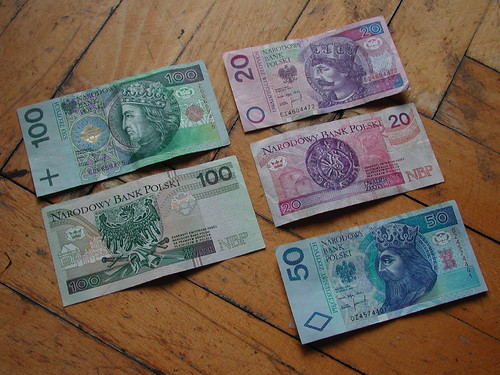Money talk! Posted by Kasia on May 3, 2014 in Phrases
Like in the United States, the United Kingdom, and the Eurozone, who effectively divide their units of currency into two – the Dollar and the Cent, the Pound and the Penny, the Euro and the Cent – Polish currency is divided into the Złoty and the Groszy (Groszy being the smaller). The smallest possible denomination in current circulation in Poland is a single Grosz, which is one hundredth of a single Złoty (here the -y ending is the singular form and -e is the plural, as you will see), which in turn appears in denominations of 2 Złote, 5/10/50/100/200 Złotych (and there’s -ych ending for the second plural form known as the ‘genitive plural’, which occurs for all monetary values of 5 and more).
Despite the rather grandiose name (imponująca nazwa), the Złoty is unfortunately not ‘golden’ – which is the literal translation of the word – but comes in a variety of shapes, from the two tier coloured 5 and 2 denominations, to the plain silver single Złoty coins. There are some bright and enticing colours adopted for the notes however and you’ll learn to love zielone Złoty (the crisp 100 Zł ‘green’ notes that will go so far in Poland). The Groszy on the other hand is something of a bane to the Poles, who can actually sell 100 single Groszy for more than 1 Złoty, simply because the metal is worth more in scrap than their implicit financial value!
The international accountancy acronym for the Polish currency is PLN (which stands for ‘Polish New’, as the Złoty is the currency that has been circulating since 1994), and this is what will be displayed in most bureau de change (Kantor wymiany in Polish). Elsewhere, in most Polish shops and markets, prices are displayed simply by displaying a number followed by Zł (to indicate the price in Złoty), and less commonly, or for specific goods, Gr (to indicate Groszy).
The word for money in Polish is pieniądze, and its plural form (which is again genitive, like Złoty) is pieniędzy (notice that stem change). If you want to pay by credit card, the word is pretty easy (karta kredytowa), and to say traveller’s cheque, just say czek podróżny.
It may also be useful to know perhaps one the most common questions of non-natives abroad – Przepraszam gdzie jest najbliższy bankomat ?(Excuse me, where is the nearest cash point) – as you’ll probably be asked, or have to ask this at some point. If anything just remember – the rather easy to remember – word for cashpoint (bankomat).
If you’re travelling to Poland there are a few things worth remembering. Firstly, always try to have some small change handy to make up the total, as it can often be difficult for shops to keep giving out change when it’s required so frequently (this is particularly important in supermarkets and on public transport, on which, in many cities, if you don’t have change for a ticket you simply can’t purchase one). Secondly it’s Złoty not Zloty – with an -ł!
Some other phrases that may come in handy are ‘nie mam pieniędzy’ (I haven’t got any money), or if you’re feeling generous and prefer the affirmative ‘mam pieniądze’ (notice the stem changes), and ‘przepraszam gdzie jest najbliższy kantor’ (excuse me, where is the nearest bureau de change).
Poland has a reputation as one of the few European destinations where you still get a lot of ‘bang for your buck’, and even though this may be changing, this is definitely still true in terms of quality of services and goods received. Hopefully this introduction to talking money in Poland will help you squeeze even more Groszy from your Złoty.
Do następnego razu… (Till next time…)

Build vocabulary, practice pronunciation, and more with Transparent Language Online. Available anytime, anywhere, on any device.
About the Author: Kasia
My name is Kasia Scontsas. I grew near Lublin, Poland and moved to Warsaw to study International Business. I have passion for languages: any languages! Currently I live in New Hampshire. I enjoy skiing, kayaking, biking and paddle boarding. My husband speaks a little Polish, but our daughters are fluent in it! I wanted to make sure that they can communicate with their Polish relatives in our native language. Teaching them Polish since they were born was the best thing I could have given them! I have been writing about learning Polish language and culture for Transparent Language’s Polish Blog since 2010.




